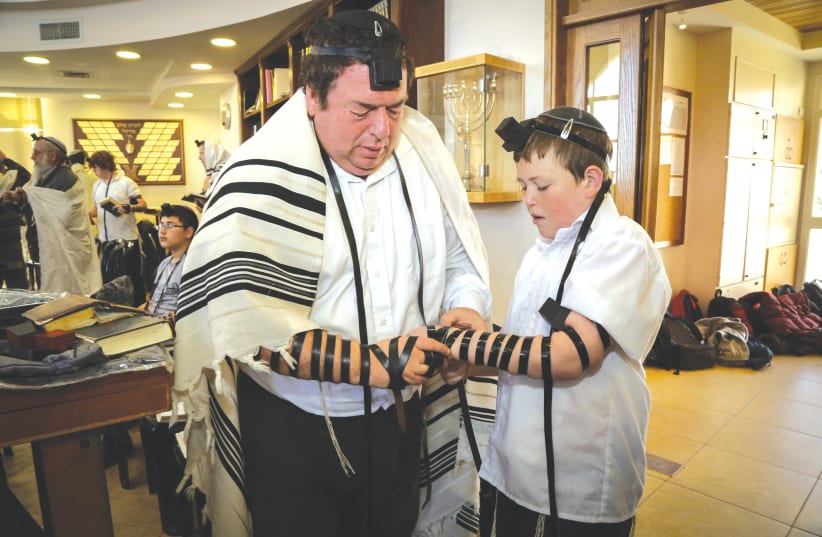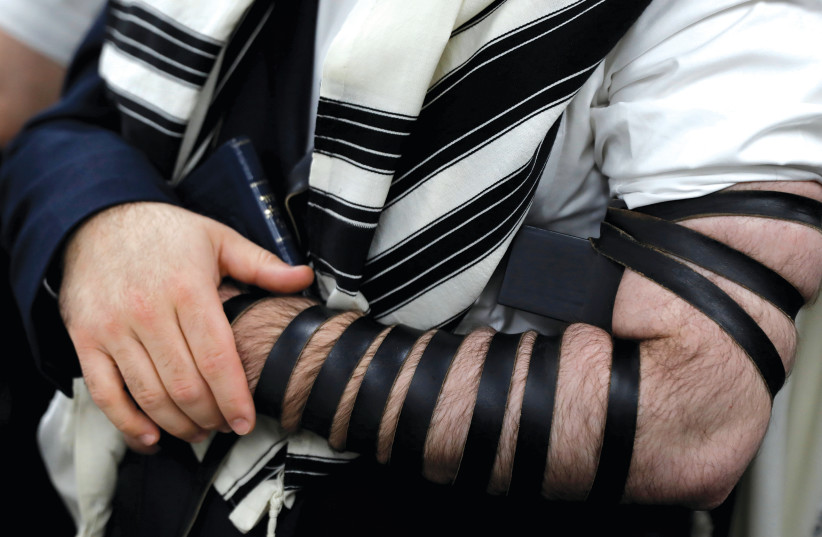A few days ago, my son went for a haircut on his day off from the army. There is nothing unusual about that, you may think. Short back and sides, owing to the restrictions placed on him as a soldier, and off he went. Except it didn’t quite end there.
Before he left, as well as giving him an army discount, the barber asked him if he’d allow him to put tefillin on him. Initially, my son, who like me isn’t religious, said no, he didn’t have time, but as the barber was a “good bloke” and quite persuasive, my son relented. And so before he left, my son, under the guidance of the barber, layed tefillin.
Later that day when he told me in passing about what had happened, I wasn’t in the least bit concerned.
A true only-in-Israel moment, I thought, but certainly not one to get all hot under the collar about.
Later that evening, I wrote a Facebook post to that effect and was shocked by some of the responses it drew.
A heated debate about the motives of the hairdresser ensued.
The Facebook tefillin debate
Shelley Goldman, a former Brit who has lived in Israel for decades, kicked off the debate with, “I hope he refused! I know this sounds harmless to you but it’s the first step in proselytizing/grooming young people and I personally know a few families that from such an innocuous beginning are now estranged from their newly religious children.”
FROM A seemingly kind offer to enable my son to lay tefillin, could I end up losing him altogether? Surely not!
She went on to explain that it starts with him laying tefillin and ends with him becoming isolated from his secular non-kosher family, i.e. us. She also likened Aish and other yeshivot who recruit seemingly hapless, irreligious individuals in order to convert them to “a cult – like the Jehovah’s witnesses... people naively mistake their warmth and hospitality as harmless, but they’re recruiting tactics and they have refined it to a fine art. You’ve been warned!”
Others supported her strident views. Simon Wrigley is one such person, who commented, “Lucky he didn’t ask me,” he said, “As an atheist, I would find that offensive. This is how they work: taking advantage of young minds. Just another tool in religious coercion,” he went on.
Some of my more observant Facebook friends jumped in to defend the barber’s actions. After all, he couldn’t defend himself. Joolz Brown was quick to remind us all that, “Sometimes tefillin is just tefillin, not a gateway drug and sometimes people are just nice.”
Adam Schogger from Manchester concurred by heaping praise on the barber, commenting, “Very nice that the hairdresser wants to share the mitzvah.” While one wag even joked, “Maybe he wanted to use the shel rosh head straps as a guide for the haircut.” A welcome distraction in an otherwise disturbing thread.
Bringing the debate to the barber
Following this Facebook furor, I was interested to hear more about the barber himself, especially in light of the fact that some even concluded from the incident that he must have been a Lubavitcher. He’s apparently not Lubavitch, according to my son, as he wore a small black kippa and tzitzit – that’s it. What to us appeared to be nothing more than a kind gesture on the part of the barber had become the subject of a rather heated debate.
I can’t help but wonder whether any mention of religion or things connected to religion, particularly now when many of us are fearful for the future of the country after last month’s election, had sparked this. An incident such as this would, in all likelihood, have normally passed off at any other time without a murmur. A few likes and the odd comment here and there perhaps but nothing more. Instead, the barber’s offer was pored over by those certain of its deeper meaning.
While there’s no doubt that there’s some truth in the concerns expressed above, on this occasion, I think the offer was sincere and above all inoffensive. He wasn’t trying to turn my son frum any more than my son has any desire to become frum. It was simply an interaction between two individuals, both of whom gained something positive from the experience. My son was pleased to have done something nice for his barber, who in turn felt he’d performed an important mitzvah. Win, win!
The writer is a former lawyer from Manchester, England. She now lives in Israel where she works as a journalist.

